This article was co-authored by Ross Cascio. Ross Cascio is a Krav Maga Worldwide self-defense, fitness, and fight instructor. He has been training and teaching Krav Maga self-defense, fitness, and fight classes at the Krav Maga Worldwide HQ Training Centers in Los Angeles, CA for over 15 years. He helps people become stronger, safer, and healthier through Krav Maga Worldwide training.
There are 10 references cited in this article, which can be found at the bottom of the page.
This article has been viewed 77,890 times.
While you should pay close attention to your surroundings and do your best to avoid threatening situations, you might find it necessary to defend yourself against an attacker. You can use an upward palm heel strike to attempt to break your attacker's nose. Maintain a wide leg stance to power your blow, then strike your attacker in an upward motion from under the nostrils. You can also try striking the sides of the nose's bridge to stun the attacker. If necessary, follow up with a strike to the head, chest, or foot to help increase the chances of your escape. As soon as possible, you should run away from the attacker, yell for help, and call emergency services.
Steps
Using a Palm Heel Strike
-
1Stand with a wide leg stance. If possible, stand with your legs at least shoulder distance apart. Bend your knees slightly. You'll need your legs to deliver the energy behind your strike, so standing with a strong leg stance is vital.
-
2Bend your open palm backward. Separate your fingers so they're not clenched and touching each other. Bend your wrist backward to deliver the strike with the heel of your palm. If you don't have much martial arts or self defense experience, you're much less likely to successfully fend off your attacker without injuring your hand if you use the heel of your palm.[1]Advertisement
-
3Strike upward and into the attacker's face. The nose is a triangular shape that's designed to take direct, straight impacts, so striking directly into the face isn't your best strategy.[2] Instead, put all your weight into your arm as you extend it upward into your attacker's nose. Aim to strike just under the nostrils and continue the movement up into the attacker's head.[3]
-
4Look for other opportunities. If your position relative to your attacker doesn't allow for an upward strike, it is also possible to break the nose with a strike from the side. Use the heel of your palm to strike the side of the nose's bridge. Even if you don't achieve a break, a strong strike will likely cause bleeding or the eyes to tear up, which should give you a chance to escape.[4]
-
5Use an improvised weapon to defend yourself. If you're wearing a belt and have the opportunity to take it off, you can wrap it around your hand and swing or punch the buckle into your attacker's face.[5] A cane or walking stick, heavy purse, solid umbrella shaft, and other items can also be used as improvised weapons.
- If you have a pen, you can close your fist around it with the sharp end exposed. Go for your attacker's eyes, throat, and neck. You can also use the same strategy with your set of keys.[6]
-
6Take your chance to flee. Once you've delivered the strike, quickly try to escape instead of taking the time to see if you successfully broke the attacker's nose. Even if you did not succeed in breaking the nose, you likely caused pain, bleeding, or flooded the attacker's eyes with tears. Act fast and use this opportunity to get away.
Using Combinations
-
1Combine another strike with your upward palm blow. You can also use a quick, one-two combination to further disable your attacker. If you elect to use a combination, you should follow up your upward palm blow with another strike immediately.[7] Don't deliver your first strike then wait a few seconds for the second one, or you'll waste valuable time that you could have used to escape.
- Your priority is to get away, but a quick combination strike can help ensure that you've stunned your attacker and are able to flee.
-
2Use an open hand hook to the attacker's head. You can use a quick combination by following your upward strike with a head strike to further disable your attacker. Immediately after striking your attacker with the upward blow, use the other heel of your hand to strike hard in the temple area of the head.[8]
- Think of the brain sitting the skull like pickles in a jar. A hard strike to the head can shake the brain, causing a concussive effect that will temporarily disable your attacker.[9]
-
3Follow up with a double palm heel strike to the chest. After striking your attacker in the nose, a hard blow to the chest will knock them down and away from you, allowing you to escape. Keep your legs in a wide stance with your knees slightly bent to power your strike. Strike your attacker in the chest with both palm heels at the same time to push them away from you, then run in the opposite direction of their fall.[10]
-
4Try an instep stomp. Stomp as hard as you can on your attacker's foot to stun them and help prevent them from chasing you. You can use an instep stomp before or after an upward strike to the nose. If an attacker has grabbed you, use an instep stomp then follow up with a nose, head, or chest strike. You could also use a nose strike first then follow up with the instep stomp to help guarantee your escape.[11]
Using Self Defense Wisely
-
1Attack back only as a last resort. Your priorities should be to always stay aware of your surroundings, safely escape a threatening situation, and to yell for help. Fighting back is a dangerous final option. If you must defend yourself, your goal is to disable or distract your attacker in order to escape.[12]
- If you're being mugged, for example, you should cooperate and give up your wallet or purse promptly instead of trying to execute a strike in self defense. Prepare a fake “mugging wallet” with only a few bills and personal effects inside just in case.
- On the other hand, if you're being coerced to go to a second location, you should make every effort to defend yourself and escape.
-
2Call emergency services as soon as possible. When possible, dial an emergency number. If you can discreetly dial before engaging your attacker, place your phone in a pocket with the line open on speaker.[13]
- If you have an emergency line open, work in the attacker's physical characteristics in verbal warnings. For example, say something like, "I will defend myself tall guy. Back away, or I'll scratch out those brown eyes, knock off that blue baseball cap, and rip out that brown hair."
-
3Leave the situation as soon as possible. If your attacker falls back or drops to the ground, leave the area immediately. Continuing your attack risks injury to yourself, and could open you up to a lawsuit or arrest depending on regional laws.[14]
- For example, you have a right to defend yourself if you believe there's an imminent risk of bodily injury. However, if you start kicking your attacker while they're down or unconscious, you might risk causing serious injury or even killing your attacker, which could eventually result in a long prison sentence.
- The attacker could also regain composure and overpower you if you stick around to try to land more blows. Just strike once or with quick combination and run away.
References
- ↑ https://www.youtube.com/watch?v=NjfGlDsY0G4&feature=youtu.be&t=45
- ↑ https://www.youtube.com/watch?v=FPrycDEavVk&feature=youtu.be&t=17
- ↑ https://www.youtube.com/watch?v=FPrycDEavVk&feature=youtu.be&t=50
- ↑ https://www.youtube.com/watch?v=FPrycDEavVk&feature=youtu.be&t=17
- ↑ http://www.personaldefenseworld.com/2014/07/improvised-weapons-5-everyday-objects-use-self-defense/3/#5-everyday-objects-to-use-for-self-defense-3
- ↑ http://www.personaldefenseworld.com/2014/07/improvised-weapons-5-everyday-objects-use-self-defense/5/#5-everyday-objects-to-use-for-self-defense-2
- ↑ https://www.youtube.com/watch?v=NjfGlDsY0G4&feature=youtu.be&t=117
- ↑ https://www.youtube.com/watch?v=NjfGlDsY0G4&feature=youtu.be&t=117
- ↑ https://www.youtube.com/watch?v=xGVZi5cvvgk
- ↑ https://www.youtube.com/watch?v=NjfGlDsY0G4&feature=youtu.be&t=136
- ↑ http://www.safebee.com/health/3-self-defense-moves-everyone-should-know
- ↑ Ross Cascio. Self Defense Trainer. Expert Interview. 13 September 2019.
- ↑ Ross Cascio. Self Defense Trainer. Expert Interview. 13 September 2019.
- ↑ Ross Cascio. Self Defense Trainer. Expert Interview. 13 September 2019.
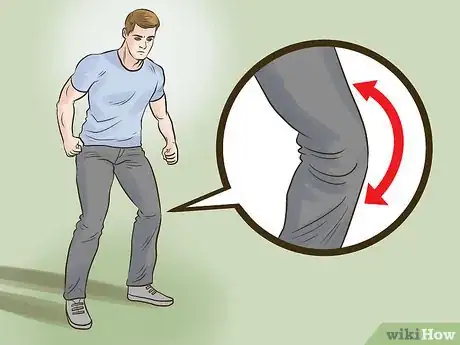
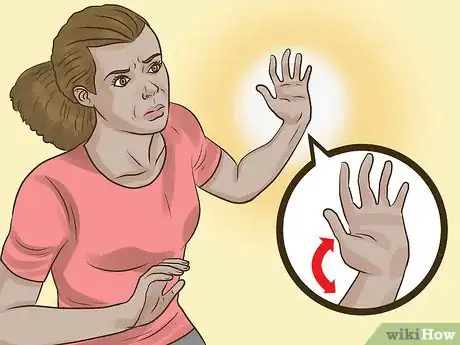
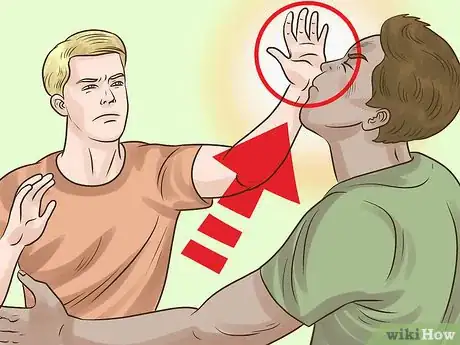
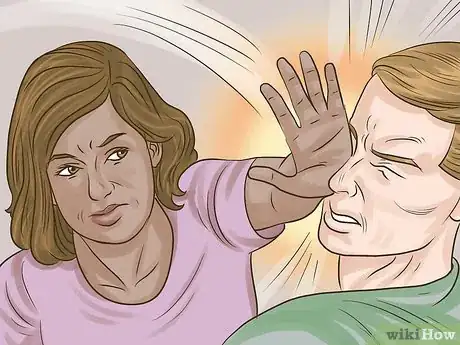
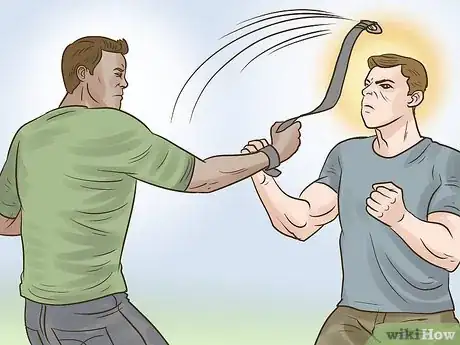
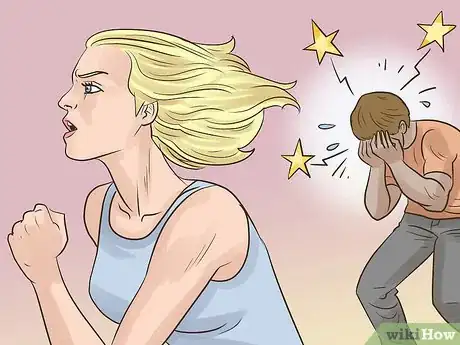
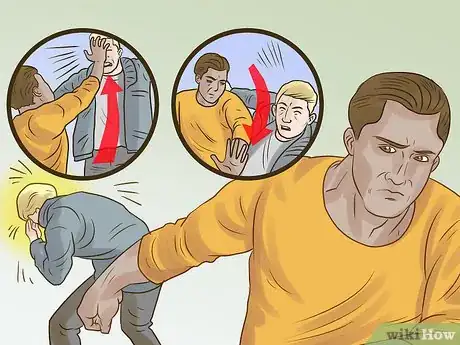
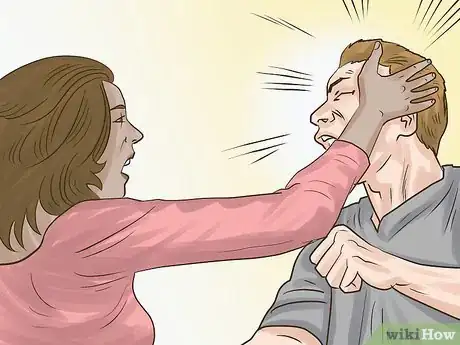
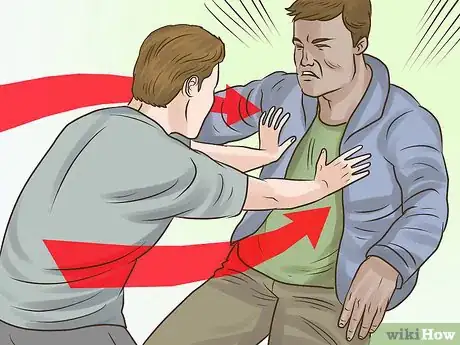
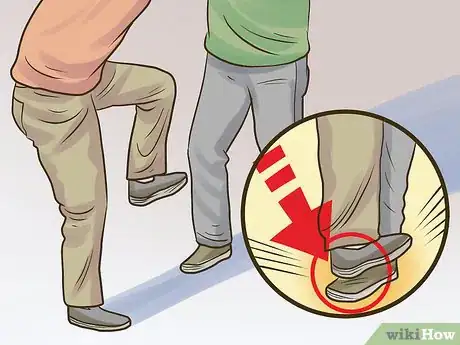
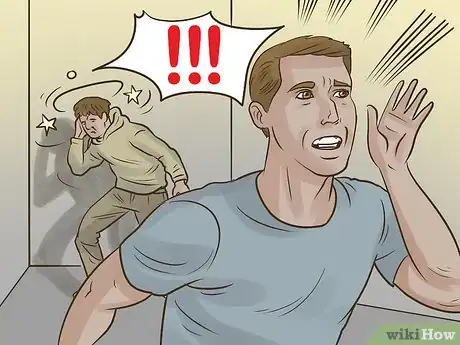

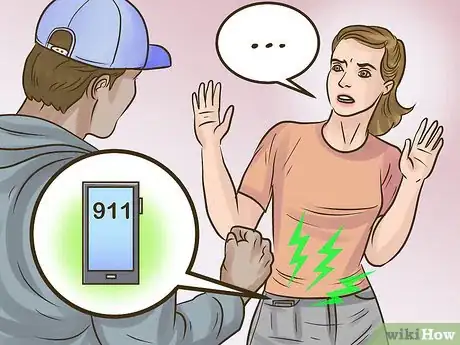
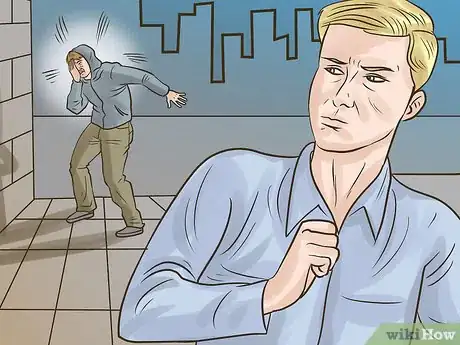
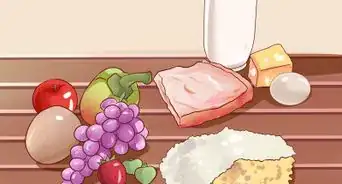


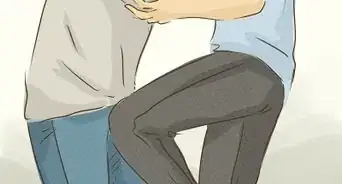
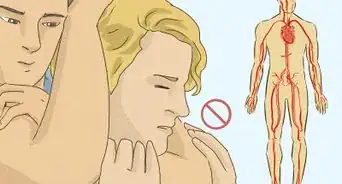
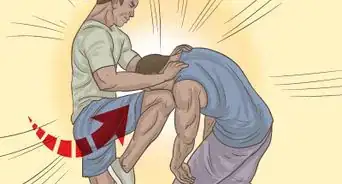
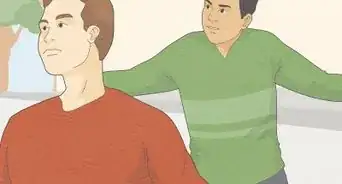


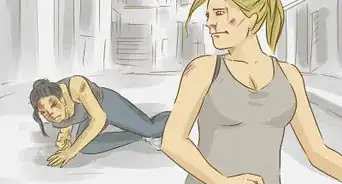

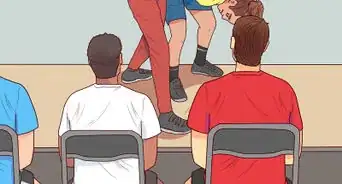
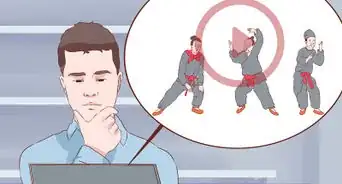
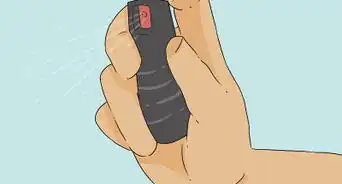








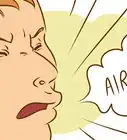
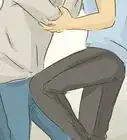



































Medical Disclaimer
The content of this article is not intended to be a substitute for professional medical advice, examination, diagnosis, or treatment. You should always contact your doctor or other qualified healthcare professional before starting, changing, or stopping any kind of health treatment.
Read More...